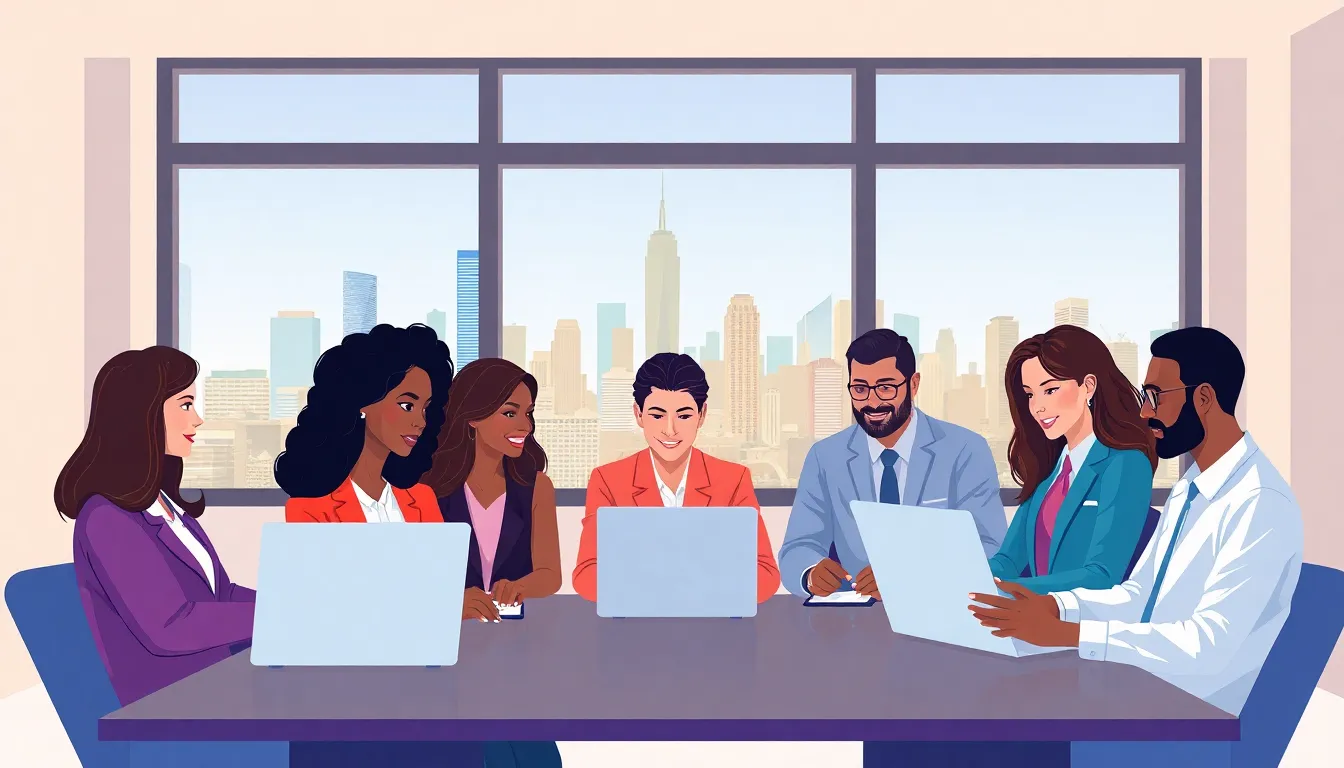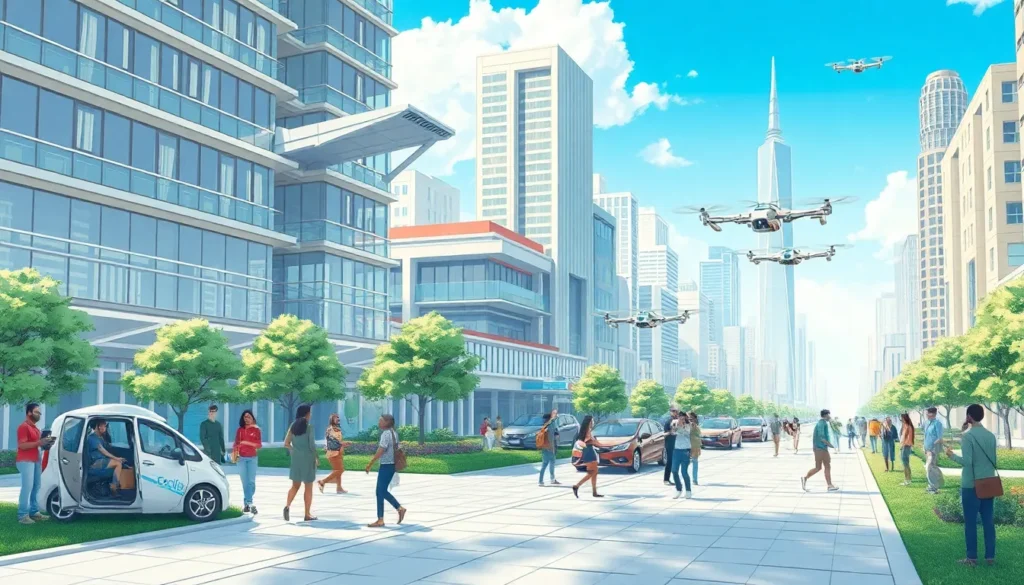Imagine a world where robots serve coffee, and flying cars are as common as bicycles. The societal future is a canvas waiting for bold strokes of innovation and creativity. As technology races ahead, it’s not just about gadgets and gizmos; it’s about how these advancements shape the way people live, work, and interact.
Table of Contents
ToggleUnderstanding Societal Future
Advanced technology reshapes society significantly. Innovations like artificial intelligence and renewable energy sources present new challenges and opportunities. Citizens experience the transformation of everyday life, from communication methods to work environments. Concepts like remote work become mainstream, allowing people to collaborate from anywhere in the world.
Social interactions evolve alongside these technological advancements. Virtual reality experiences create immersive environments for education and entertainment. Augmented reality applications enhance daily tasks, merging digital information with the physical world.
As lifestyle changes occur, societal values also shift. People prioritize sustainability as climate change awareness increases. Ethical considerations surrounding technology influence decisions in various sectors, from healthcare to education.
Economic models adapt to this evolving landscape. Business structures become more flexible, embracing gig economies and shared resources. Job markets continually require new skills, highlighting the importance of lifelong learning and adaptability.
Governments and organizations must navigate these changes. Policies evolve to support innovation while ensuring equity and accessibility. Collaboration between public and private sectors becomes essential to address societal needs.
Engagement with community and culture remains central to societal future. Art and creativity thrive in digital platforms, expanding access to diverse voices. This interaction enriches cultural landscapes and fosters global understanding.
Overall, a societal future characterized by integration and innovation emerges. People play an active role in shaping this future, making conscious choices that align with evolving norms and expectations. Society continuously adapts, embracing change as an opportunity for growth and development.
Key Trends Shaping the Societal Future

Society evolves through various transformative trends that redefine interactions, work, and values. Notable elements contributing to this change include technological advancements and environmental considerations.
Technological Advancements
Artificial intelligence significantly enhances productivity and efficiency across sectors. Automation transforms traditional job roles, creating new opportunities and requiring skill adaptation. Virtual and augmented reality reshapes social interactions, offering unique experiences beyond physical constraints. Moreover, advancements in communication technologies enable seamless connections, fostering global collaboration. Remote work becomes a permanent fixture, allowing populations to engage with diverse markets. Innovation thrives in this landscape as individuals embrace digital tools for personal and professional growth.
Environmental Considerations
Renewable energy solutions are at the forefront of environmental consciousness, driving societal shifts toward sustainability. Increased awareness of climate change influences consumer behavior, leading to heightened demand for eco-friendly products and services. Urban areas prioritize green spaces and sustainable infrastructure, creating healthier living conditions. Corporations adopt practices that minimize ecological footprints, thus promoting corporate responsibility. Policies supporting environmental protection gain traction, advocating for legislation that addresses climate issues. Communities rally around local initiatives, fostering a collective commitment to a sustainable future.
Impact of Globalization on Societal Future
Globalization significantly shapes the societal future by facilitating cultural exchange and collaborative innovation. As companies expand operations across borders, diverse ideas and practices merge, influencing local and global cultures. Individuals gain access to a broader array of goods, services, and information, enhancing lifestyles and economic opportunities.
Technology plays a crucial role in this process. The internet connects people worldwide, enabling interaction and knowledge sharing. Social media platforms foster a sense of community despite geographical distances, allowing cultural movements to gain momentum and promoting social issues.
Economic integration brings benefits and challenges. Job markets evolve as businesses seek talent from global pools, creating competition for local workers. Upskilling becomes necessary, with many needing to adapt to emerging technologies and new industry demands. Economies increasingly depend on global supply chains, making them vulnerable to international disruptions.
Environmental concerns also rise within this context. Globalization contributes to increased carbon footprints, prompting a call for environmentally sustainable practices. Companies and governments recognize this need, leading to greater collaboration on global climate initiatives.
Policies evolve to address these changes. To foster fair trade and sustainable practices, governments negotiate agreements that promote human rights and environmental protection. Community initiatives gain traction as citizens advocate for responsible business practices and environmental conservation.
Entrepreneurial activities flourish as globalization forms new markets. Startups spring up to meet shifting consumer demands, showcasing creativity and innovation. These businesses often focus on sustainability, aligning profit motives with societal well-being.
Overall, globalization lays a foundation for a socially dynamic future. It encourages individuals to engage with a diverse range of perspectives, fostering inclusivity and social progress.
Challenges Facing Society
Society confronts numerous challenges as it looks to the future. Economic inequality and political polarization significantly impact cohesion and stability.
Economic Inequality
Economic inequality persists as a defining challenge. Wealth concentration in the hands of a few undermines social mobility. Access to resources, education, and healthcare varies widely, creating divides within communities. Significant disparities influence overall quality of life and limit opportunities for many individuals. Citizens, especially in marginalized populations, find barriers that hinder personal and professional growth. Policymakers must prioritize creating equitable systems to address these inequalities. Initiatives promoting fair wages and access to quality education present pathways for bridging gaps. Collaborative efforts among businesses, governments, and nonprofits can foster inclusive economic growth.
Political Polarization
Political polarization has intensified, dividing societies into increasingly opposing factions. Disparate political beliefs inhibit constructive dialogue and compromise. Trust in institutions falters as citizens align more closely with extreme views. Media platforms often amplify divisive narratives, complicating efforts to foster unity. Communities experience increased tensions over policy decisions, leading to social unrest. Finding common ground becomes challenging, yet essential for progress. Engaging citizens in open discussions can promote understanding and cooperation. Collaborative governance initiatives might counteract polarization, emphasizing shared goals and values. Active participation in local governance plays a vital role in rebuilding trust and fostering community engagement.
The societal future is poised to be shaped by a blend of technological advancements and a commitment to sustainability. As innovations redefine everyday experiences, individuals will need to adapt and embrace new opportunities.
Globalization will continue to enhance cultural exchanges while presenting challenges that require thoughtful solutions. The call for equitable systems and community engagement will be vital in addressing economic disparities and political divisions.
Ultimately, the path forward hinges on collaboration and a shared vision for a more inclusive and innovative society. Embracing change with a focus on ethical considerations will pave the way for a future rich in possibilities.









